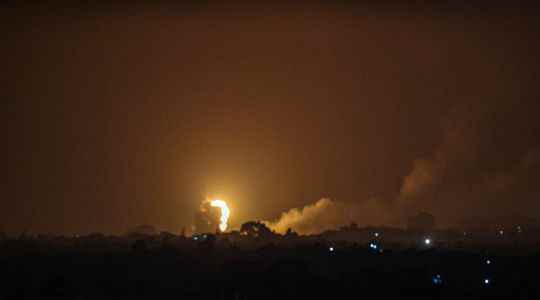History stutters in this region of the Middle East. Tuesday, April 19, the tension remains palpable after the first Israeli airstrikes for months on the Gaza Strip, in retaliation for a rocket attack from the Palestinian enclave. A few days earlier, more than 150 Palestinians were injured in clashes with Israeli forces on Friday and Sunday at the Al-Aqsa Mosque – located in the Old City of Jerusalem – which welcomes tens of thousands of Muslim worshipers daily for the month of Ramadan, a place also visited at specific time slots by Jews.
The resurgence of violence is reminiscent of the express conflict that erupted in the spring of 2021. David Rigoulet-Roze, associate researcher at IRIS and specialist in the Middle East, discusses the root causes of these new tensions during this Easter week end.
L’Express: Rocket fire from Gaza, attacks in Jerusalem… How did we get here?
David Rigoulet-Roze: Behind this resurgence of violence is the question of access to the esplanade of the Mosques – the ultra-sensitive epicenter of the Israeli-Palestinian conflict on which the religious question is grafted. This year, there is a superimposition of the calendar, between the month of Ramadan (from April 1 to May 1), a month of prayer for the faithful, Jewish Passover (Passover, from April 15 to 23) and Christian Easter, which was held this Sunday, April 17. This layering gives a very particular configuration and increases the risk of climbing.
We must understand the special status of the esplanade of the Mosques. It is governed by the status quo which places it under the administration of the Waqf under Jordan since 1967. Concretely: only Muslims have the right to pray there. For their part, the Jews have the right to go there to visit the places but without praying and at a fixed time so as not to find themselves simultaneously with Muslim faithful. The objective is to avoid any dangerous telescoping.
In what context is this resurgence of violence occurring and should we fear an escalation like last year?
We are not in the same configuration as in the spring of 2021. Hamas – the Palestinian armed Islamist movement which controls the Gaza Strip – has emerged weakened by the eleven-day war and does not seem to want the situation to degenerate. Also, Hamas fears losing the thousands of work visas granted to Palestinians in Gaza. Currently, 12,000 visas have been issued and there are plans to increase to 20,000 as part of a policy to compensate for the blockade imposed on the Palestinian enclave.
These work permits represent a breathing valve for the Palestinian economy – and Gaza in particular – whose poverty rate is 60% and that of unemployment more than 50%. At the same time, Hamas does not wish to be overwhelmed by other forces like the Islamist Jihad, another Palestinian armed Islamist group (which maintains relations with Hezbollah and, beyond that, with the Islamic Republic of Iran), which appeared chronologically before Hamas, the Palestinian emanation of the Muslim Brotherhood and largely hegemonic in the Gaza Strip. However, Monday, April 18, the Islamist Jihad threatened a new military escalation.
On the Israeli side, the situation is all the more sensitive as the country has been confronted since the end of March with a succession of terrorist attacks (in particular on March 22 in Beer Sheeva, March 27 in Hadera attributable to the State Islam, March 29 in Bnei Brak, then April 7 in Tel Aviv attributable to Palestinians from Jenin, perhaps in connection with Islamic Jihad, editor’s note) having left 14 dead and dozens injured in the heart of Israeli cities . After this series of terrorist attacks, the Israeli government gave carte blanche to the army and the various security services. Israeli Prime Minister Naftali Bennett does not want to give the appearance of weakness to his political enemies, although an escalation of tension is not in his interest. In fact, on April 6, he was put in difficulty in the Knesset, when the head of the government coalition, Idit Sliman, defected, depriving the coalition of its majority.
How do you see events evolving in the coming days?
Everyone is worried. The escalation in this region was the subject of a meeting of the UN Security Council behind closed doors. An initiative that had been requested by France, Ireland, China, Norway and the United Arab Emirates. In order to prevent the situation from degenerating further, it is a question of trying to put in place inhibiting mechanisms, calling on the spirit of responsibility of all parties, in order to avoid reproducing the same scenario as the ‘last year.
More generally, the episodes of violence are repeated because the basic questions are not resolved. These tensions are bound to resurface episodically. With religious holidays, we can believe that it is a situational phenomenon, but this type of feverish outbreak seems to become quasi-structural for lack of a fundamental solution to the conflict at work. Mechanically, things are called upon to repeat themselves, more or less regularly and on a more or less large scale depending on the circumstances, whether it is a coincidence in the calendar or an uncontrolled slippage linked to a unplanned event.
